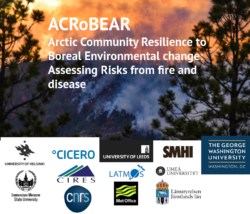ACRoBEAR

Arctic Community Resilience to Boreal Environmental change: Assessing Risks from fire and disease (ACRoBEAR)
The goal of ACRoBEAR is to predict and understand health risks from wildfire air pollution and natural-focal disease at high latitudes, under rapid Arctic climate change, and resilience and adaptability of communities across the region to these risks. This will be achieved through integrating health data and knowledge, community knowledge and stakeholder dialogue, with satellite and in-situ observations, and numerical modelling.
ACRoBEAR is a €2M project, involving 10 research organisations across 7 nations, funded under the Belmont Forum Climate, Environment and Health research action.
Why?
The Arctic has warmed rapidly over recent decades, at around twice the rate of global mean temperature increases, resulting in rapid changes to the high latitude Earth system. Changes in the high latitude terrestrial environment include observed increases in temperature extremes and precipitation patterns, which are leading to increasing trends in boreal wildfire and changes in the distribution of disease-carrying vectors. Recent years have seen unprecedented fire activity at Arctic latitudes, leading to unhealthy air quality in high latitude towns and cities. Vector-borne disease occurrence in these regions is also changing in response to rapid changes in temperature and moisture. Moreover, fire activity is intrinsically linked to changes in vector-borne disease risk through changing the habitat conditions for vectors and their hosts. Environmental, social, and governance factors specific to high latitudes hamper our current ability to understand community resilience and response to these changing risks. ACRoBEAR will tackle these urgent issues in the most rapidly warming region of the planet.
How?
The project will engage in two-way dialogue with community groups and stakeholders throughout, across three key regions (Alaska, Eastern Siberia, Sweden). These groups will take an active part in co-design of specific research questions, and contribute local and indigenous knowledge to the development of new understanding within the project. ACRoBEAR aims to connect natural science with local community and stakeholder priorities, and to integrate natural science with local community knowledge and understanding. The ACRoBEAR team comprises world-leading experts in air pollution, climate science, natural-focal disease, social science and governance, landscape fire science, and health science, from across four European countries, Russia, and the United States. The unique interdisciplinary team will allow an end-to-end state-of-the art assessment of community resilience to changes in risk due to wildfire and natural-focal disease at high latitudes as a result of rapid Arctic warming. The planned workflow exploits cross-disciplinary collaboration and knowledge transfer to deliver integrated outcomes.
Who will benefit?
ACRoBEAR will benefit a broad range of local and national-level stakeholders, including local communities, government, health and forestry agencies, and local and national policy makers. ACRoBEAR will deliver substantial impact on local communities, policy makers and health agencies in Arctic nations. Impact will result from providing new understanding to enable implementation of robust measures for mitigating harmful health impacts due to changes in high latitude wildfire and natural-focal disease and development of policy options to enable adaptation and increase resilience, tailored to regional communities and governance structures. The key legacy impact will be a series of web-based data tools and resources, carefully tailored to community and stakeholder needs via continual two-way dialogue throughout the project.
